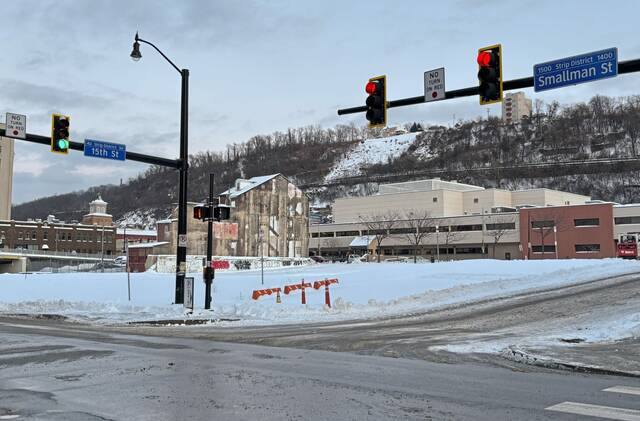Despite challenges that included a 17% unemployment rate and loss of more than 200,000 jobs at the height of the coronavirus pandemic last year, the leaders of the Pittsburgh region’s primary development agency are optimistic for a rebound and excited for the future.
“This has been a deep human tragedy,” said Laura Karet, the new chair of the Allegheny Conference on Community Development, during its annual meeting Thursday. “We have a lot to do and we need to get it done.” The meeting was held virtually, broadcast over Zoom.
Karet, president and CEO of Giant Eagle, thanked the front-line workers in the region, including Giant Eagle’s employees, who do not have the luxury of working from home as the pandemic continues.
Karet is the first woman to serve as chair of the Allegheny Conference, which coordinates economic development and for and promotes the Pittsburgh region. The Allegheny Conference was founded in 1944 to make plans for post-World War II Pittsburgh. It now serves the 10-county region, including Armstrong, Beaver, Butler, Fayette, Greene, Indiana, Lawrence, Washington and Westmoreland counties.
“When the region wins, we all win,” Karet said.
Karet succeeds PNC President and CEO Bill Demchak in the role. Demchak is now chairman of the Pittsburgh Regional Alliance, the economic development arm of the conference.
More than 1,000 business and community leaders from the area watched as Karet, Allegheny Conference CEO Stefani Pashman and other members of the conference’s leadership highlighted the progress made in 2020 and outlined what they hope to accomplish in 2021.
The group worked to distribute 575,000 pieces of personal protective equipment like face masks to groups that need it. The conference also set up a covid portal that’s an active clearinghouse on information and statistics about covid-19.
Because of the pandemic, there are 85,000 fewer jobs in the region when compared to January 2020 and the unemployment rate is hovering just about 6%, Pashman said. More than one-third of businesses are facing decreases in demand, productivity and cash as the anniversary of the pandemic’s start in the region nears, Pashman said.
Even with those numbers, leaders of the group are optimistic for the future.
In September, the Next is Now campaign was launched as a marketing plan for region.
Next is Now is designed so community leaders in each county can use it to promote their strengths to the world.
The group is also working to address racial equity issues that also came to the forefront in 2020, as the May death of George Floyd by police in Minneapolis galvanized the Black Lives Matter movement.
The reinvigorated movement was preceded by a 2019 report by University of Pittsburgh researchers that spotlighted racial and gender inequities in Pittsburgh.
Settling those inequities is part of the group’s 10-year work plan released last year. It aims to recruit and retain Black and minority professionals in the region and also makes criminal justice reforms a priority.
The plan reflects “concrete, sincere steps to eradicate systemic racism,” Pashman said.
She pointed to the conference’s efforts to aid passage of a law enacted in 2020 to ease expungement of minor criminal records that hinder some from getting jobs.
“We will eradicate and improve racial equity for all people. We can and we must do better,” Karet said.
Pashman also lauded the Pittsburgh Passport program, which connected more than 1,700 college students from 30 countries in a program that was virtual because of the pandemic.
Last year, the conference’s Strategic Investment Fund also provided $7 million in gap funding to help Astrobotic, a company that’s working to build payloads that will land on the moon, to locate in Pittsburgh’s Manchester neighborhood.
The conference is also working to address transportation infrastructure needs including a bus rapid transit plan to connect Downtown to Oakland that was awarded $100 million in federal aid last year.
The group is also lobbying for tax reform at the state level, Demchak said.
Pennsylvania’s 9.9% corporate net income tax rate is among the highest in the country and makes it less attractive for companies to do business here, Demchak said.
Leaders in Texas, where there is nary a corporate tax, have tried to lure Pittsburgh-based PNC, which Demchak leads, to move there.
“ ‘You can come down and move your headquarters here and we will support you,’ ” Demchak said Texas leaders told him.
PNC isn’t going anywhere, he said, but the tax structure in Pennsylvania needs to change so more companies will either remain or locate in the state.
In addition to Demchak’s role at PRA, the conference announced new chairs for its two other arms. Bryan Salesky, founder and CEO of Argo AI, the autonomous driving technology company, is chair of the Greater Pittsburgh Chamber of Commerce. Rebekah Byers Kcehowski, partner-in-charge of the Jones Day law firm Pittsburgh office, is co-chair of the Pennsylvania Economy League of Greater Pittsburgh; Manchester Bidwell Corp. Executive Chairman Bill Strickland is its other co-chair.
“I’m beyond excited to see how the unique strengths of this set of newly appointed leaders — including our first female chair — will further bring into focus the vision of regional vitality for all,” said Pashman, who became the first woman to lead the conference when named CEO in 2017.











